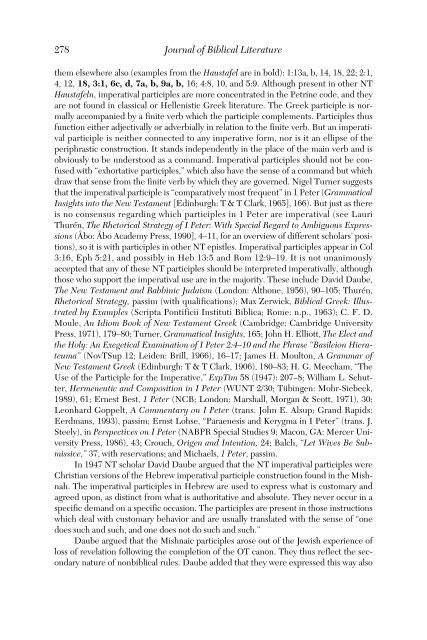Journal of Biblical Literature - Society of Biblical Literature
Journal of Biblical Literature - Society of Biblical Literature
Journal of Biblical Literature - Society of Biblical Literature
You also want an ePaper? Increase the reach of your titles
YUMPU automatically turns print PDFs into web optimized ePapers that Google loves.
278<br />
<strong>Journal</strong> <strong>of</strong> <strong>Biblical</strong> <strong>Literature</strong><br />
them elsewhere also (examples from the Haustafel are in bold): 1:13a, b, 14, 18, 22; 2:1,<br />
4, 12, 18, 3:1, 6c, d, 7a, b, 9a, b, 16; 4:8, 10, and 5:9. Although present in other NT<br />
Haustafeln, imperatival participles are more concentrated in the Petrine code, and they<br />
are not found in classical or Hellenistic Greek literature. The Greek participle is normally<br />
accompanied by a finite verb which the participle complements. Participles thus<br />
function either adjectivally or adverbially in relation to the finite verb. But an imperatival<br />
participle is neither connected to any imperative form, nor is it an ellipse <strong>of</strong> the<br />
periphrastic construction. It stands independently in the place <strong>of</strong> the main verb and is<br />
obviously to be understood as a command. Imperatival participles should not be confused<br />
with “exhortative participles,” which also have the sense <strong>of</strong> a command but which<br />
draw that sense from the finite verb by which they are governed. Nigel Turner suggests<br />
that the imperatival participle is “comparatively most frequent” in 1 Peter (Grammatical<br />
Insights into the New Testament [Edinburgh: T & T Clark, 1965], 166). But just as there<br />
is no consensus regarding which participles in 1 Peter are imperatival (see Lauri<br />
Thurén, The Rhetorical Strategy <strong>of</strong> I Peter: With Special Regard to Ambiguous Expressions<br />
(Åbo: Åbo Academy Press, 1990], 4–11, for an overview <strong>of</strong> different scholars’ positions),<br />
so it is with participles in other NT epistles. Imperatival participles appear in Col<br />
3:16, Eph 5:21, and possibly in Heb 13:5 and Rom 12:9–19. It is not unanimously<br />
accepted that any <strong>of</strong> these NT participles should be interpreted imperativally, although<br />
those who support the imperatival use are in the majority. These include David Daube,<br />
The New Testament and Rabbinic Judaism (London: Althone, 1956), 90–105; Thurén,<br />
Rhetorical Strategy, passim (with qualifications); Max Zerwick, <strong>Biblical</strong> Greek: Illustrated<br />
by Examples (Scripta Pontificii Instituti Biblica; Rome: n.p., 1963); C. F. D.<br />
Moule, An Idiom Book <strong>of</strong> New Testament Greek (Cambridge: Cambridge University<br />
Press, 1971), 179–80; Turner, Grammatical Insights, 165; John H. Elliott, The Elect and<br />
the Holy: An Exegetical Examination <strong>of</strong> I Peter 2:4–10 and the Phrase “Basileion Hierateuma”<br />
(NovTSup 12; Leiden: Brill, 1966), 16–17; James H. Moulton, A Grammar <strong>of</strong><br />
New Testament Greek (Edinburgh: T & T Clark, 1906), 180–83; H. G. Meecham, “The<br />
Use <strong>of</strong> the Participle for the Imperative,” ExpTim 58 (1947): 207–8; William L. Schutter,<br />
Hermeneutic and Composition in I Peter (WUNT 2/30; Tübingen: Mohr-Siebeck,<br />
1989), 61; Ernest Best, 1 Peter (NCB; London: Marshall, Morgan & Scott, 1971), 30;<br />
Leonhard Goppelt, A Commentary on I Peter (trans. John E. Alsup; Grand Rapids:<br />
Eerdmans, 1993), passim; Ernst Lohse, “Paraenesis and Kerygma in I Peter” (trans. J.<br />
Steely), in Perspectives on I Peter (NABPR Special Studies 9; Macon, GA: Mercer University<br />
Press, 1986), 43; Crouch, Origen and Intention, 24; Balch, “Let Wives Be Submissive,”<br />
37, with reservations; and Michaels, 1 Peter, passim.<br />
In 1947 NT scholar David Daube argued that the NT imperatival participles were<br />
Christian versions <strong>of</strong> the Hebrew imperatival participle construction found in the Mishnah.<br />
The imperatival participles in Hebrew are used to express what is customary and<br />
agreed upon, as distinct from what is authoritative and absolute. They never occur in a<br />
specific demand on a specific occasion. The participles are present in those instructions<br />
which deal with customary behavior and are usually translated with the sense <strong>of</strong> “one<br />
does such and such, and one does not do such and such.”<br />
Daube argued that the Mishnaic participles arose out <strong>of</strong> the Jewish experience <strong>of</strong><br />
loss <strong>of</strong> revelation following the completion <strong>of</strong> the OT canon. They thus reflect the secondary<br />
nature <strong>of</strong> nonbiblical rules. Daube added that they were expressed this way also

















